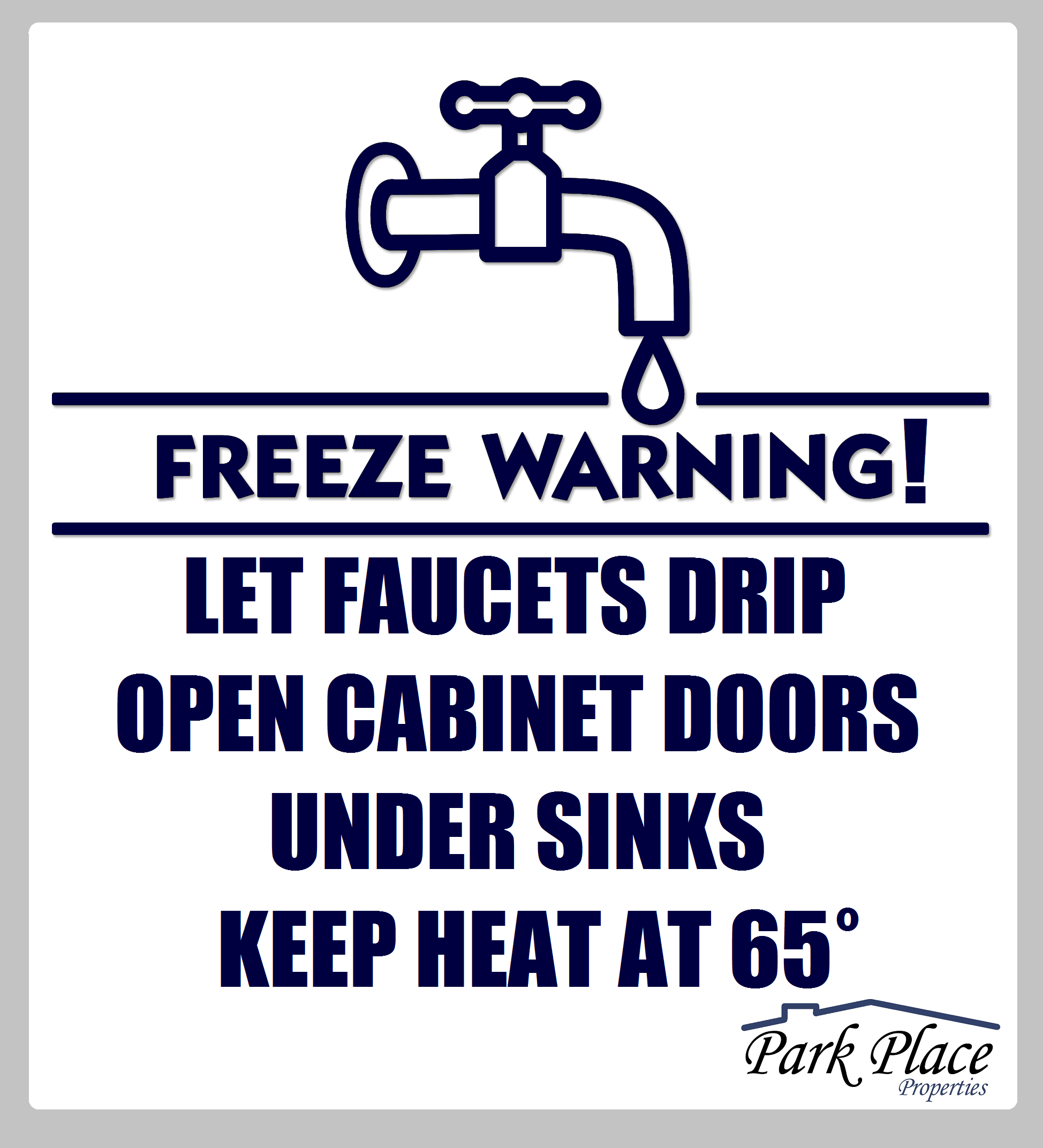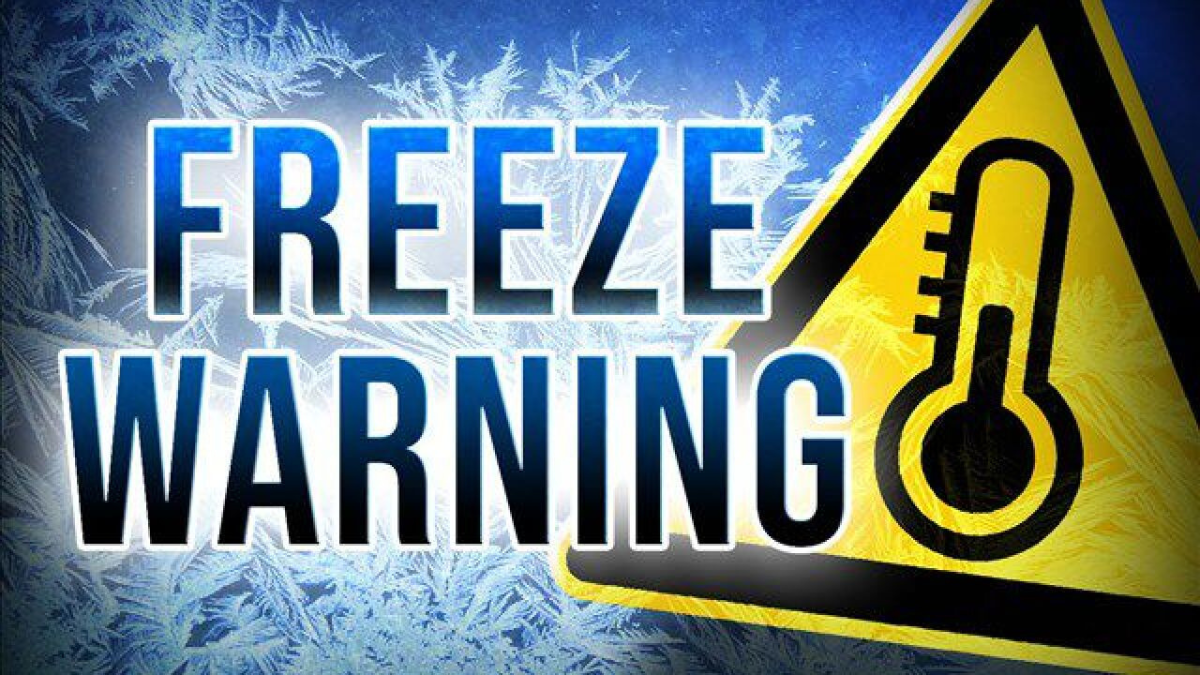Hey there, friend. Ever been caught off guard by a sudden freeze warning? It's like Mother Nature's way of saying, "Hey, it's about to get chilly!" A freeze warning is more than just a weather alert—it's a heads-up that can help you protect your home, your health, and even your wallet. So, let's dive into what a freeze warning really means and how you can prep like a pro.
You know those days when you wake up, look out the window, and see frost covering everything? That's not just a picturesque moment; it could be a sign of a freeze warning in action. These warnings are issued by meteorologists when temperatures are expected to drop below freezing, usually around 32°F or lower. And trust me, this isn't something you want to ignore.
Now, before we get too deep into it, let's talk about why freeze warnings matter. Whether you're a homeowner, a gardener, or just someone who doesn't want to wake up to frozen pipes, understanding freeze warnings can save you a ton of hassle. So grab your favorite cozy drink, and let's break it down together.
Read also:Aagmaal Men Your Ultimate Guide To Understanding This Revolutionary Concept
What Exactly Is a Freeze Warning?
Alright, let's start with the basics. A freeze warning is like a red flag from the weather gods. It's issued when temperatures are expected to drop low enough to damage crops, harm outdoor plants, and cause issues for infrastructure like water pipes. Think of it as nature's way of saying, "Hey, it's gonna get cold, so get ready!"
When Do Freeze Warnings Happen?
Freeze warnings typically pop up during the colder months, but they can happen at any time of year in certain regions. For example, if you're living in a place where freezing temps are rare, a sudden drop in temperature can catch you off guard. In areas like Florida or California, a freeze warning might seem unusual, but it can still happen!
How Are Freeze Warnings Different from Frost Advisories?
Good question! While both involve cold weather, they're not the same thing. A frost advisory usually means temperatures will hover around freezing, but not quite dip below. On the other hand, a freeze warning means temps are gonna drop below 32°F, and that can cause some serious problems. So yeah, it's like the difference between a light chill and a full-on freeze.
Why Should You Care About Freeze Warnings?
Here's the deal: freeze warnings aren't just for farmers or gardeners. They affect everyone, from the pipes in your house to the plants in your backyard. Ignoring a freeze warning can lead to burst pipes, damaged crops, and even health risks if you're not prepared. So yeah, it's kinda a big deal.
Impact on Agriculture
Agriculture takes a massive hit during freeze warnings. Farmers have to work overtime to protect their crops from frost damage. Imagine waking up to find all your hard work frozen solid—that's a nightmare no farmer wants to face. From citrus fruits in Florida to vineyards in California, freeze warnings can ruin entire harvests if precautions aren't taken.
Risk to Homeowners
For homeowners, freeze warnings mean one thing: frozen pipes. And frozen pipes can lead to burst pipes, which can cause thousands of dollars in damage. Plus, if you're not careful, your water supply could be cut off entirely. Nobody wants to deal with that, right?
Read also:Wolfsburg Vs Barcelona The Clash Of Titans In European Football
How to Prepare for a Freeze Warning
Now that we've covered why freeze warnings matter, let's talk about how you can prep. Preparing for a freeze warning is all about being proactive. Here's a quick rundown of what you need to do:
- Insulate your pipes: Wrap them up with foam insulation to keep the cold out.
- Bring in your plants: If you've got potted plants outside, move them indoors or cover them with blankets.
- Check your heating system: Make sure your furnace is in good working order before the cold hits.
- Stock up on essentials: Grab some extra blankets, non-perishable food, and water just in case.
Protecting Your Pipes
Let's focus on pipes for a sec. Pipes are like the veins of your home—if they freeze, things can get messy fast. Insulating them is key, but you can also let your faucets drip slightly to keep water flowing. Trust me, it's better than dealing with a burst pipe in the middle of the night.
Understanding the Science Behind Freeze Warnings
Now, let's get a little nerdy. Freeze warnings are based on a combination of factors, including air temperature, wind chill, and dew point. Meteorologists use advanced technology to predict when and where temperatures will drop below freezing. It's like weather forecasting on steroids!
How Meteorologists Predict Freeze Warnings
Meteorologists use tools like weather balloons, satellites, and computer models to track temperature changes. They look at things like atmospheric pressure, wind patterns, and moisture levels to determine if a freeze is likely. It's a complex process, but it's super effective at keeping us informed.
Common Misconceptions About Freeze Warnings
There are a few myths floating around about freeze warnings. For example, some people think that covering plants with plastic is a good idea. Wrong! Plastic can actually trap moisture, which can make frost damage worse. Stick with breathable materials like blankets or burlap instead.
Freeze Warning History and Trends
Freeze warnings have been around for a while, but they've become more accurate thanks to advancements in technology. In the past, farmers relied on经验 and gut feelings to predict freezes. Nowadays, we have precise forecasts that can save crops and homes from disaster.
Notable Freeze Events
There have been some pretty memorable freeze events over the years. One of the biggest was the 1989 freeze in Florida, which wiped out entire citrus crops. Another was the 2010 freeze in California, which devastated vineyards across the state. These events highlight just how important freeze warnings really are.
Health Risks During Freeze Warnings
Let's not forget about the health risks associated with freeze warnings. When temperatures drop, hypothermia and frostbite become real concerns. It's crucial to stay warm and dry during these times. Layer up with warm clothing, and make sure you have a reliable heat source in your home.
Protecting Vulnerable Populations
Elderly folks and young children are especially vulnerable during freeze warnings. They might not be able to regulate their body temperature as well as others, so it's important to check on them regularly. Make sure they have access to warm clothing and a safe place to stay during the cold snap.
Freeze Warning Resources and Tools
Thankfully, there are tons of resources available to help you stay informed during freeze warnings. Websites like the National Weather Service and apps like Weather Underground can provide up-to-the-minute updates. You can also sign up for alerts from local authorities to get notified when a freeze warning is issued.
Mobile Apps for Freeze Warnings
Mobile apps are a game-changer when it comes to freeze warnings. They can send you push notifications when a warning is issued, so you're always in the know. Some apps even offer personalized alerts based on your location, which is super handy if you're traveling.
Conclusion: Stay Ahead of the Cold
Alright, that's the scoop on freeze warnings. They might seem like a hassle, but they're actually a lifesaver when it comes to protecting your home, your health, and your wallet. By staying informed and taking the right precautions, you can weather the storm (literally!) with ease.
So here's my call to action: share this article with your friends and family. The more people know about freeze warnings, the better prepared we all are. And if you've got any tips or tricks for dealing with the cold, drop them in the comments below. Let's keep each other warm and safe this winter!
Table of Contents
Freeze Warning: Stay Prepared and Stay Safe
What Exactly Is a Freeze Warning?
When Do Freeze Warnings Happen?
How Are Freeze Warnings Different from Frost Advisories?
Why Should You Care About Freeze Warnings?
How to Prepare for a Freeze Warning
Understanding the Science Behind Freeze Warnings


